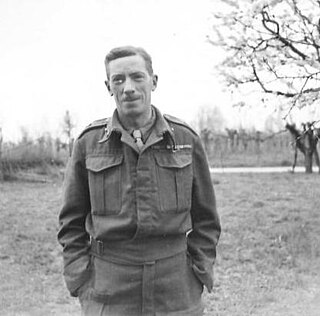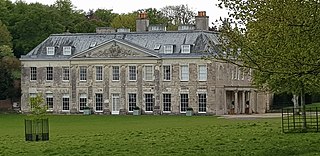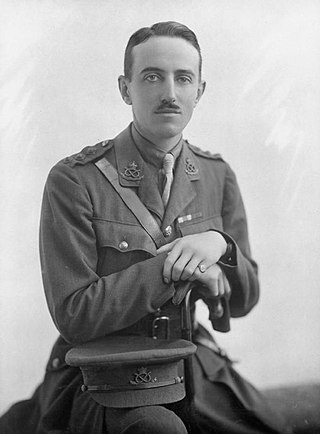
Field Marshal John Standish Surtees Prendergast Vereker, 6th Viscount Gort, was a senior British Army officer. As a young officer during the First World War, he was decorated with the Victoria Cross for his actions during the Battle of the Canal du Nord. During the 1930s he served as Chief of the Imperial General Staff. He is best known for commanding the British Expeditionary Force that was sent to France in the first year of the Second World War, only to be evacuated from Dunkirk the following year. Gort later served as Governor of Gibraltar and Malta, and High Commissioner for Palestine and Transjordan.

Lieutenant-General Bernard Cyril Freyberg, 1st Baron Freyberg, was a British-born New Zealand soldier and Victoria Cross recipient, who served as the 7th governor-general of New Zealand from 1946 to 1952.

The title Baron of Dunsany or, more commonly, Lord Dunsany, is one of the oldest dignities in the Peerage of Ireland, one of just a handful of 13th- to 15th-century titles still extant, having had 21 holders, of the Plunkett name, to date. Other surviving medieval baronies include Kerry, Kingsale, Trimlestown (1469), Baron Louth, and Dunboyne.

Major General Robert Keith Arbuthnott, 15th Viscount of Arbuthnott, was a senior British Army officer who served in both the First World War and the Second World War.

Sir Reginald Aylmer Ranfurly Plunkett-Ernle-Erle-Drax, KCB, DSO, JP, DL, commonly known as Reginald Plunkett or Reginald Drax, was an Anglo-Irish admiral. The younger son of the 17th Baron of Dunsany, he was Director of the Royal Naval Staff College, President of the Naval Inter-Allied Commission of Control in (Berlin), commander-in-chief of successive Royal Navy bases. His brother Edward, who became the 18th Baron of Dunsany, was best known as the famous playwright and author Lord Dunsany. Edward inherited the paternal estates in Ireland, while Reginald was bequeathed most of his mother's inheritance across portions of the West Indies, Kent, Surrey, Dorset, Wiltshire and Yorkshire. He extended his surname by special Royal licence in 1916, and was noted for the quadruple-name result, Plunkett-Ernle-Erle-Drax.
Lieutenant General Arthur Nugent Floyer-Acland, was a senior officer of the British Army who served in both the First and Second World Wars. He was Military Secretary from 1940 to 1942. In later life, he was High Sheriff and Deputy Lieutenant of Dorset.

Field Marshal Allan Francis Harding, 1st Baron Harding of Petherton,, known as John Harding, was a senior British Army officer who fought in both the First World War and the Second World War, served in the Malayan Emergency, and later advised the British government on the response to the Mau Mau Uprising. He also served as Chief of the Imperial General Staff (CIGS), the professional head of the British Army, and was Governor of Cyprus from 1955 to 1957 during the Cyprus Emergency. In both Kenya and Cyprus his rule was controversial and authoritarian, based on persecutions and executions.

Charborough House, also known as Charborough Park, is a Grade I listed building, the manor house of the ancient manor of Charborough. The house is between the villages of Sturminster Marshall and Bere Regis in Dorset, England.
John William Plunkett, 17th Baron of Dunsany was an Anglo-Irish Conservative politician and peer.
Major General Wilfrid Lewis Lloyd CBE, DSO and Bar, MC was an officer in the British Army and the British Indian Army during the First and Second world wars.

Lieutenant-General Sir Edmond Charles Acton Schreiber, was a senior British Army officer who served in both the First World War and the Second World War. In the latter he commanded the 45th Infantry Division, V Corps and the British First Army.
General Sir James Newton Rodney Moore,, usually known as Sir Rodney Moore, was a senior British Army officer. He fought in the Second World War and Palestine Emergency, and was General Officer Commanding London District from 1957 to 1959. Moore was appointed the inaugural Chief of Malaysian Armed Forces Staff from 1959 to 1965, a post he occupied during the final stages of the Malayan Emergency and early period of the Indonesia–Malaysia confrontation. His final posting was as Defence Services Secretary from 1964 to 1966.
General Sir Clive Gerard Liddell, was a senior British Army officer who served as Adjutant-General to the Forces from 1937 to 1939. He was Governor of Gibraltar from 1939 to 1941 during the early stages of the Second World War.
General Sir Thomas Cecil Hook Pearson, was a senior officer of the British Army who served as Commander-in-Chief of Allied Forces Northern Europe from 1972 to 1974. At the time of his death, he was the oldest living British full general.
General Sir Charles Parker Deedes, was a senior British Army officer who went on to be Military Secretary.
General Sir Sydney Frederick Muspratt was a senior British Indian Army officer who went on to be Military Secretary to the India Office.

Richard Grosvenor Plunkett-Ernle-Erle-Drax is a British Conservative Party politician, landowner and former journalist serving as the Member of Parliament (MP) for South Dorset since 2010.
Major-General Douglas Fitzgerald McConnel was a senior British Army officer who served as General Officer Commanding (GOC) British Troops in Palestine and Trans-Jordan.
Major General Sir John Emilius Laurie, 6th Baronet, was a British Army officer.

Major-General Robert Francis Brydges Naylor, was a general officer in the British Army. During the Second World War he was Major-General in charge of Administration at the War Office from 1939 to 1941, Deputy Quartermaster-General from 1941 to 1943, Vice Quartermaster-General from 1943 to 1944, and Commander of the Line of Communications of the 21st Army Group in the North-West Europe Campaign of 1944–45.











